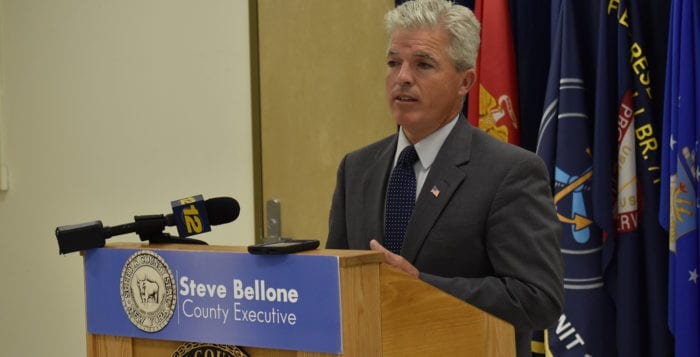Every dog has its day, and Town of Smithtown could be handing a juicy opportunity to any private organization looking to run its animal shelter.
Town officials are looking to potentially turn partial control of the Town of Smithtown Animal Shelter and Adoption Center over to a private company. One caveat, though, is board members warn they will only go through with the plan if it doesn’t cost more than the town already spends.
“In my opinion, if this were to go through, the organization would have to be animal experts or organizations that are expert in the care of animals,” Supervisor Ed Wehrheim (R) said. “And it has to be financially feasible. If the RFP comes back and it would be in excess of what we pay now we wouldn’t support it.”
The town board voted 4-1 July 17 to put out a request for proposal for any private organization that is interested in assuming day-to-day operations of the shelter.
“We’ve been discussing this for more than 18 months as a board,” Wehrheim said. “Prior to choosing the director, if that happens and we keep it, the board has had conversations for professional animal
organizations who would agree to come in and operate the animal shelter in a public-private partnership. This is strictly exploratory.”
The supervisor said that some groups have already shown interest. Under the proposed plan, current animal control officers employed by the town would remain in place. The town would continue to assume the maintenance of the property and building, as well as handling any animal control or capture programs. The incoming private organization would handle the day-to-day operations, including feeding, cleaning and fostering the cats and dogs.
The shelter has not had a director since Sue Hansen was suspended by the town from the position in February 2017 after allegations surfaced of incompetence and mismanagement. Hansen has a pending lawsuit against the town for being arrested on allegations of criminal trespassing on the town property after her suspension. She had taken over the reins from George Beatty, who resigned in 2015, after a
scandal surfaced with claims of animal neglect and abuse.
Supervision of the shelter has since fallen to the town’s Department of Public Safety headed by Director John Valentine. Councilwoman Lisa Inzerillo (R) said those public safety officers in the shelter would move back to the department office should this plan go into effect.
Wehrheim said they were looking for nonprofits already involved in animal care, but he did not rule out any for-profit organizations coming in.
Inzerillo, the liaison to the shelter, voted against the RFP, though she said she didn’t necessarily disagree with the concept. Instead, the councilwoman said she wished the town would have waited until after they finished upgrades to the shelter such as the construction of the new independent Trap, Neuter and Release building.
Smithtown has attained a $168,000 grant to build a new TNR building on the existing property. The town will pull matching funds equal to 25 percent of the grant, or approximately $56,250, from the town’s capital budget to complete the project, and it expects to begin building in early 2019.
“I would have preferred to have some more time to make an informed decision … or to potentially discuss the idea with experts first or in a work session with the board,” Inzerillo said. “I have the utmost faith in my fellow board members that they would not commit to anything concrete that would put these projects in jeopardy.”




















